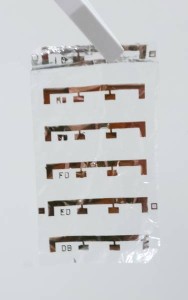
Scientists from Germany and Japan have developed a new magnetic sensor, which is thin, robust and pliable enough to be smoothly adapted to human skin, even to the most flexible part of the human palm.
Image: IFW Dresden
Humans possess five basic senses: touch, sight, hearing, taste and smell. While we do not inherently possess any senses beyond those five, it is possible to tap into extended senses through science and technology.
Magnetoception, for example, is a sense which allows bacteria, insects and even vertebrates like birds and sharks to detect magnetic fields for orientation and navigation. While humans cannot organically perceive magnetic fields, scientist have just created a new sensor that may allow us to do so.
Researchers from Germany and Japan have developed a new magnetic sensor that is thin and pliable enough to be adapted to the human skin. This innovation makes equipping humans with magnetic senses a more viable reality.
This from Leibniz Institute for Solid State and Materials Research Dresden:
These novel magneto-electronics are less than two micrometers thick and weights only three gram per square meter; they can even float on a soap bubble. The new magnetic sensors withstand extreme bending with radii of less than three micrometer, and survive crumpling like a piece of paper without sacrificing the sensor performance. On elastic supports like a rubber band, they can be stretched to more than 270 percent and for over 1,000 cycles without fatigue. These versatile features are imparted to the magnetoelectronic elements by their ultra-thin and –flexible, yet robust polymeric support.

